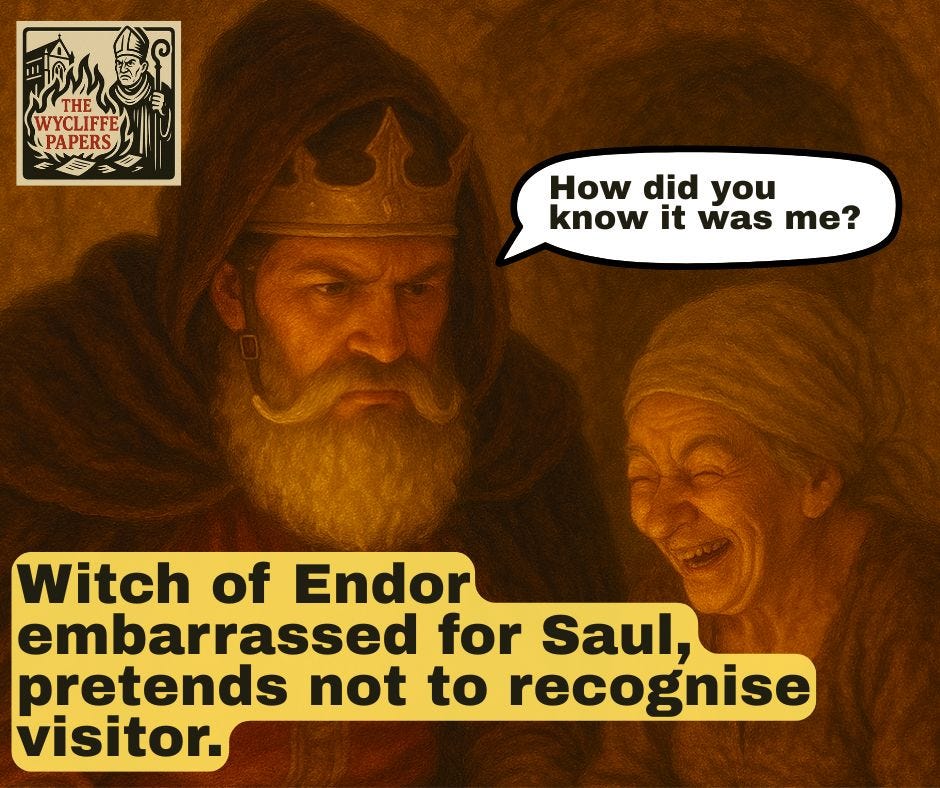Hugh Latimer is Playing with Fire
A new documentary about one of the Oxford Martyrs
Cary’s Almanac normally drops on a Friday, but we’re early this week because today is 16th October. That’s the day when the Church of England remembers Bishop Hugh Latimer who was burned with Bishop Nicholas Ridley in Oxford in 1555.
I decided to make a video about Latimer for reasons I explain below. By the time I’d done the research, I wanted to do the man justice, and get his story right. The result is a 48-minute video, so something to watch while you’re having your lunch today, or maybe this evening:
Why I was drawn to Hugh Latimer
Born around the time of the Battle of Bosworth in 1485 when the Tudors grabbed the throne from King Richard III, Latimer would never have been a knight. He could have become an archer, being the son of a yeoman farmer. That’s one reason I’m attracted to him: I too am a farmer’s son and, like Latimer, farming is in my blood.
Like Latimer, I’m not really cut out for farming. Latimer was a wordsmith and a preacher. I call myself a ‘stand-up theologian’ who’s written scripts for prime-time BBC TV. I’ve had to literally live by my wits like Latimer, who, in his pomp in 1548, was a prime-time preacher at St Paul’s Cross in London.
As a comedy writer, I know full well that some people can have a serious sense of humour failure. Comedy brings controversy. (I wrote about that in The Sacred Art of Joking). Latimer caused plenty of that. Sometimes it worked in his favour, bringing him to the attention of King Henry VIII, and winning the affection of King Edward VI and the Protestant faction. But sometimes it worked against him as he made powerful enemies who eventually did for him in 1555.
As a man, I also think about cowardice and courage, especially in the face of physical intimidation. Lots of men wonder how they would have responded to persecution, violence or a death sentence. Would we recant our deeply held beliefs to avoid the flames? Would we take the humiliation of walking through the streets of London with a faggot of wood on our shoulders to show we understood what would happen to us if we stepped out of line again?
Latimer was interrogated and harassed on many occasions, finding himself thrown into the Tower of London on two separate occasions. He was also hauled up before bishops, archbishops and Cardinal Wolsey, as well as preaching to King Henry VIII and Edward VI. Latimer was not one of those awkward types who could start an argument in solitary confinement like Bishop Hooper, who met a similar fate on the pyre. (I made a shorter video about Hooper earlier this year.) Latimer was careful. But he rarely took a backward step.
When it came to it, he didn’t run away to Europe when the heat was literally turned up. He went willingly to the flames, suffering the same fate as many of his friends, including men who were key to the rediscovery of the scriptures, such as Thomas Bilney, and those who had helped in the early days like Robert Barnes.
The stakes could not have been higher. This was a battle of ideas to the death. But it’s not just about individuals, it’s about the soul of a nation—the nation of England. Would the Anglo-Saxons continue to be spiritually ruled by the Roman Church? Or go their own way and be part of the unseen, worldwide Church? My Protestantism is probably showing.
Latimer is a key part of the story of England’s soul. But what really attracted me to this yeoman’s son was his insouciant wit in his final hour. On his way to the flames, according to Foxe, Latimer joked:
“Be of good comfort, Master Ridley, and play the man: we shall this day light such a candle, by God’s grace, in England, as I trust shall never be put out.”
Jokes are really important because they reveal what is really important. And this joke shows that Latimer considered his own life to be less important than the theological principles he was defending quite literally to the death. Words are powerful, but sometimes actions speak even louder. They certainly did on 16th October 1555 because we’re still talking about it today. Or at least, I am:
If you’re interested in Church history and how it relates to our lives and our nation today, why not subscribe to Cary’s Almanac which is free and every Friday (except this week…)
Why are we so weird about reading the Bible?
Why do we happily rewatch our favourite comedies yet struggle to open the Bible we claim to love? In The Stand-Up Theologian podcast, pastor–author Andrew Sach and I explore that mystery with wit and warmth—from Mitchell & Webb sketches to the fractal depths of Scripture which was written for ordinary people and rewards curiosity, not perfection. We swap practical tips (eg. listen to Poirot / read it aloud) and look at patterns and echoes in 1 & 2 Kings, where prophets can be assassins and kings consult witches in terrible disguises (see pic, below).
This is an irresistible invitation to rediscover the Bible as the most surprising, funny, and alive book you’ll ever read. But first, listen to the podcast, yeah?



